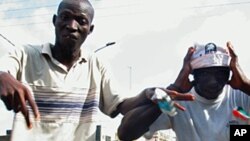Civil society groups and religious leaders from war-divided Ivory Coast recently came to Washington to share their deep concerns about the lingering political stalemate and deteriorating social conditions in their country. They also say they will try to play a greater role in finding a solution.
A date for elections in Ivory Coast, pushed back repeatedly since 2005, remains unknown, frustrating the head of a collective of civil society groups, Patrick N'gouan.
"We do not know," said Patrick N'gouan. "[Can] anybody say if we will get elections before the end of the year? We do not know any date."
N'Gouan made the comment at a recent gathering organized by the United States Institute of Peace.
Ivory Coast has been divided since late 2002. Northern-based rebels say they are seeking free and fair elections, and equal rights for hundreds of thousands of undocumented northerners.
Many of them are sons and daughters or grandchildren of migrant workers from neighboring countries, who came to work on cocoa plantations decades ago.
The most recent stalemate has been over establishing a proper voting list. Supporters of President Laurent Gbagbo accuse the opposition-dominated election commission of adding hundreds of thousands of foreigners to voter rolls, a claim it denies.
Previous roadblocks to successive peace deals, such as allowing opposition leaders to run in the next election have been lifted, but others, such as disarming southern militias and creating a unified army, remain.
In recent years, persistent insecurity, growing corruption, as well as sliding foreign investment have created a situation in which a growing number of civilians are finding food for just one meal a day, while infrastructure in cities and towns crumbles.
N'Gouan says it is time the Ivorian civil society is taken seriously because civilians in the north and south, and not politicians, rebel leaders or soldiers, are the ones suffering.
"Civil society at the beginning tried to organize itself to get more strength to be involved in the process of the solution but nobody, [not] the international community, domestic parties, the government, ruling party and the opposition, nobody wants to take account of civil society, even despite our organization, our determination to participate in the search of a solution," he said.
Religious leaders from all faiths also came together at the conference in Washington.
The president of the superior council of Imams in Ivory Coast, Boikary Fofana, says the situation among unemployed youth in the commercial capital Abidjan is worrisome.
He says he recently tried to intervene during a clash between two gangs in the Abobo neighborhood of Abidjan.
"There were around 2,000 young men taking weapons," said Boikary Fofana. "They wanted to fight against another group because this group has killed one of them. I tried to be involved and asked the police responsible there, what is happening. He said, people are fighting each other. I asked him, can I be involved and intervene in the situation? He said, yes."
Fofana says there are parts of neighborhoods in Abidjan now called Colombia, Zulu and Marley, which he explained are names related to drugs and violence.
"This phenomenon is new in Ivory Coast," he said. "When we tried to discuss with them, we discovered the same groups are in eight areas in Abidjan. I think the origin of this situation is the political crisis. There are no jobs. There are no economic opportunities for youth. So they are trying now to organize themselves in gangs and groups of violence."
The religious leaders pledged to come together with civil society groups to hold public sessions and try to bring political adversaries in Ivory Coast to end the current stalemate.
They also urged the U.S. government to help Ivory Coast end the impasse, warning the gang situation could quickly get worse and out of control, with more and more drugs passing through West Africa, from Latin America to Europe.
Opposition supporters in Abidjan decided to postpone a planned protest Saturday, saying they wanted to avoid possible rioting and a deadly military crackdown, as was the case in previous demonstrations.
Ivory Coast Civil Society, Religious Leaders Share Deep Concerns




